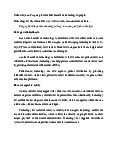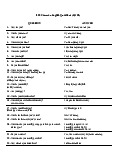




Preview text:
SECTION 1: CHECK THE ABILITY TO RECOGNIZE AND DESCRIBE THE WAYS
OF PRODUCTION OF CONSONANT OR VOWEL SOUNDS IN WORDS
A. Write the phonetic symbols for the last sound in each of the following words. Then
give its phonetic description.
e.g.: bang _/ŋ/__ voiced alveolar nasal
1. seek /k/ __voiceless velar stops 2. catch /t /__ ʃ
voiceless alveo-palatal affricates
3. produced /t/ ___voiceless alveolar stops
B. Write the phonetic symbol for the vowel sound
in each of the following. Then give its phonetic descriptions 1. need
/i:/__long, tense, high, front, spread 2. caught
/ɔː/__long, tense, mid, back, strong lip-rounding, not protruded vowel 3. food
/u:/__long, tense, high, back, rounded slightly protruded vowel
C. For each of the following symbols provide the correct phonetic description and a
word that begins with that sound
Example, [s] voiceless alveolar fricative - stop
1. /d/ _______ voiced alveolar stops- dog
2. /i:/_______ long, tense, high, front, spread- equal 3. /t /_______ ʃ
voiceless alveo-palatal affricate- change
D. Write the phonetic symbols of all the sounds in the word ‘brother’ and give its full
name e.g.: bang _/ b æ ŋ/
/b/ voiced bilabial stop
/æ/ short low front, slightly spread vowel which is tenser than /e/
/ŋ/voiced alveolar nasal Brother _ / br ˈ ðər/ ʌ
/b/ voiced bilabial stop /r/ retroflex alveolar
/ʌ/ short, lax, fairly low, central, neutral vowel
/ð/ voiced inter-dental fricative
/ə/ short, lax, mid, central, neutral vowel which only occurs in unstressed syllables /r/ retroflex alveolar
E. Circle the word that begin with:
a. a bilabial consonant: mat; gnat; sat; bat; rat; pat
b. a velar consonant: knot; got; lot; cut; hot; pot
F. Circle the word that end with:
a. a nasal: rain; rang; dumb; eat
b. a stop: lop; lit; group; crab; dog; hide; back
c. an affricate: much; back; edge; ooze
G. Circle the words that contain:
a. A low vowel: weed; was; load; lad; rude
b. A high vowel: sat; suit; got; meet; mud
c. A front vowel: gate; caught; cat; kit; put
d. A back vowel: maid; weep; coop; cop; good
H. In each of the following words, give a phonemic transcription for:
a. the first sounds: though; contact; pneumonia; thought; judge; Thomas; physics; civic; usury
/ð/, /k/, /n/, /θ/, /dʒ/, /θ/, /f/, /s/, /j/
b. the last sounds: fleece; long; health; watch; rough; cheese; bleached; rags
/s/, /ŋ/, /θ/, /t /, /f/, /z/, /d/, /s/ ʃ
I. Write the symbol that corresponds to each of the following phonetic description, then
give an English word that contains this sound.
a. voiceless bilabial unaspirated stop ____speech
SECTION 2: CHECK THE ABILITY TO RECOGNIZE THE SYLLABLE
STRUCTURE AND STRESSED SYLLABLE IN WORDS
A. Underline the stressed syllable classroom technological biology withdrew national estimate
B. Analyze the syllable structure of the following words σ e.g.: ‘cramped’ Rime Onset coda Nucleus k r æ m p t DONE a. squealed b. eighths c. splash d. texts e. types f. which g. words h. asked i. front j. raised k. cure l. thwart m. huge n. shriek o. square p. stew q. sprawl r. splice s. sphinx t. suit
C. Put an acute accent ( ´ ) on the main stressed syllable of the following words. a. Politician b. democratic c. personality d. photograph /ˌpɒl.ɪˈt .ən/ / ɪʃ ˌdem.ə kræt. ˈ ɪk/ / p ˌ ɜː.sənˈæl.ə.ti/ / fə ˈ .tə. ʊ r ɡ f/ ɑː e. photographically f. benefit g. mechanical h. family /ˌfə .tə ʊ ˈɡræf.ɪ.kəl.i/ / ben. ˈ
ɪ.fɪt/ /məˈkæn.ɪ.kəl/ / fæ ˈ m.əl.i/ i. mechanization j. contemplate k. meteorology l. telegraph /ˌmek.ə.na ze ɪˈ . ɪ ən/ / ʃ ˈk n.təm.ple ɒ t/ ɪ / mi ˌ .ti.ə ː r ˈ l.ə.d ɒ ʒi/ /ˈtel. . ɪ ɡr f/ ɑː m. telegraphy n. diplomat o. diplomatic p. monotonous
/təˈleɡ.rə.fi/ /ˈdɪp.lə.mæt/ / d ˌ p.lə ɪ ˈmæt.ɪk/ /mə n ˈ t.ən.əs/ ɒ q. generosity r. manipulate s. nobility t. comedian
/ˌdʒen.əˈrɒs.ə.ti/ /mə n ˈ p.jə.le ɪ t/ /nə ɪ b ʊˈ l.ə.ti/ /kə ɪ ˈmiː.di.ən/ u. secretary v. grammatical w. clockwise x. defective
/ˈsek.rə.tər.i/ /ɡrə mæt. ˈ .kəl/ / ɪ kl ˈ k.wa ɒ z/ /d ɪ fek.t ɪˈ v/ ɪ y. confirmation z. language /ˌkɒn.fəˈme . ɪ ən/ / ʃ ˈlæŋ.ɡw d ɪ / ʒ
D. Consider the words in group A&B
What is the difference between…. (final sounds, vowel sounds…) A B date /de t/ ɪ dat/dæt/ bite/ba t/ ɪ bit /b t/ ɪ sold/sə ld/ ʊ sod /s d/ ɒ code/kəʊd/ cod /k d/ ɒ
These pairs of words are minimal pairs because they are identical in every sound except one
sound (vowel sound), occurring at the same position.
SECTION 3: CHECK THE ABILITY TO RECOGNIZE AND DISTINGUISH THE
WORDS IN ENGLISH THAT HAVE SIMILAR/DIFFERENT WAYS OF PRODUCTION
A. Which of the following words would be treated as minimal pairs? (Can those pairs of
words be treated as minimal pairs?) Explain why.
pin - coke – fin – cheap - bin - jeep – joke
Minimal pairs are: pin-fin-bin, coke-joke, cheap-jeep /p n/-/f ɪ n/- /b ɪ n/, /kə ɪ k ʊ /- /d ə ʒ ʊk/, /tʃiːp/- /d i ʒ p/ ː
Those pairs of words be treated as minimal pairs because they are identical in every sound
except one sound (phoneme), occurring at the same position.
B. Which word has a different vowel sound? 1. nothing enough mouse 2. slowly mouth round 3. food good wood
C. Supply another word for the following pairs to form minimal pairs 1. cat - hat 2. kind - find 3. pig - big 4. miss - kiss 5. lamp - camp 6. mouse - house 7. fill - ill 8. lift - shift 9. shoe - chew 10. sort – short
D. Create 3 words which are contrastive by supplying different vowels (diphthongs) in
the following consonantal frames [sk_] scar score [b_m] bomb bam bum [m_t] meet moot moat [p_] pitch patch
SECTION 4 CHECK THE ABILITY TO ANALYZE AND APPLY THE CHANGES IN SOUND
A. Which of these words would most likely be pronounced with a syllabic consonant
Bottle, copper, knuckle, threaten
Cattle, balance, struggle, eaten
Muddle, wagon, trouble, broken
B. Which segments in the pronunciation of the following words are most likely affected by elision?
interest, government, pumpkin, sandwich
sign, paradigm, funeral, postman
design, mystery, acts, potato
C. English /p/ and /b/ can form minimal pairs. Find minimal pairs for that contrast in
initial; medial; and final positions. Big- pig Nibble-nipple tribe -tripe -------
D. Give examples to illustrate the following rules vowel nasalized vowel alveolar + bilabial bilabial
E. Consider the phonological changes that occur in producing the following words in
connected speech. Give explanations for the rules. Tonight /t’nait/ => Elision
The weak vowel sound /ə/ is also omitted if it comes before /n/, /l/ or /r/ and /n/, /l/ or /r/ become syllabic white coat /waik kəut/ =>Regressive assimilation
The phoneme that comes first is affected by the one that comes after it. /t/ -> /k/
SECTION 5 CHECK THE ABILITY TO APPLY THE PHONETIC AND
PHONOLOGICAL RULES IN PRONUNCIATION (Multiple choice questions)
Sounds made with the tongue blade touching the alveolar ridge are called ___ . A. alveolars B. alveodentals C. alveopalatals




